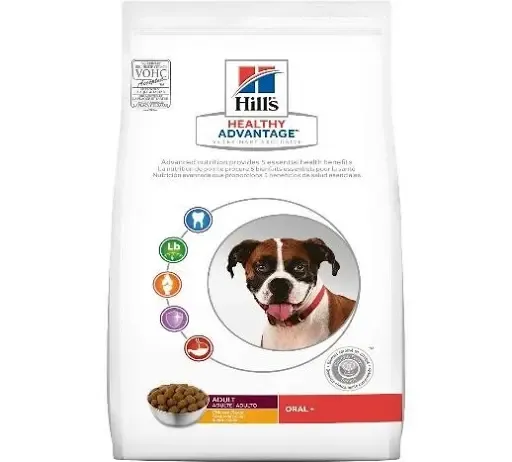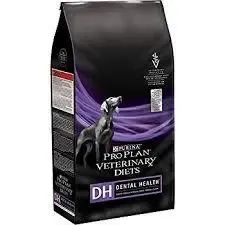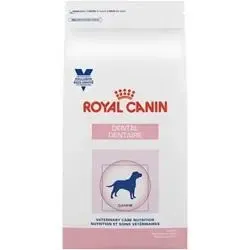Feeding your beloved canine companion is a cherished part of the human-animal bond. What if that daily meal could also contribute to their sparkling smile? Discovering the Healthy Advantage Oral Care For Dogs through specialized diets offers a significant bonus, transforming mealtime into a proactive dental health strategy. While daily brushing remains the gold standard, the natural act of chewing is a powerful ally in reducing plaque accumulation. This means that safe, chewable toys and the right kibble can actively participate in your dog’s dental hygiene. As veterinary professionals, we strongly advocate for incorporating kibble specifically formulated to support canine dental health into your dog’s regular feeding routine.
When oral hygiene is neglected, a complex process occurs in your dog’s mouth. Oral bacteria, combined with calcium, phosphorus, food debris, and saliva, contribute to the formation of plaque. If this plaque isn’t regularly removed, it hardens into tartar, firmly adhering to the tooth surface. At this advanced stage, professional veterinary intervention, including ultrasonic scaling under anesthesia, is necessary. Persistent plaque and tartar build-up inevitably lead to gum inflammation and the more serious condition of periodontal disease.
Beyond specialized chews and treats, daily food offers a continuous and convenient way to support your dog’s dental well-being. Imagine the satisfaction of knowing that every meal you serve is actively contributing to a healthier mouth, without the hassle of remembering an extra treat or worrying about added calories! This approach makes maintaining your dog’s oral health not just manageable, but remarkably integrated into their daily life.
 Hills Healthy Advantage Oral+ Kibble
Hills Healthy Advantage Oral+ Kibble
1. Hill’s Science Diet Dental Health Prescription Diet
Hill’s Science Diet Healthy Advantage Oral+ is a multi-faceted diet designed to offer more than just dental support. It also contributes to weight management, promotes easy digestion, and enhances skin health. The kibble pieces are notably larger than average, featuring a special coating engineered to minimize plaque buildup and combat halitosis. Dogs find its flavor irresistible, and the larger kibble size encourages a slower eating pace, which can be particularly beneficial for “gulpers.” This diet is considered a prescription formula and is readily accessible through most veterinary clinics.
 Purina Pro Plan Veterinary Diets DH Dental Health Canine Formula Kibble
Purina Pro Plan Veterinary Diets DH Dental Health Canine Formula Kibble
2. Purina Pro Plan Veterinary Diets DH Dental Health Canine Formula
Purina’s Dental Health Diet stands out as another excellent option for enhancing your dog’s oral hygiene. Its specifically engineered crunchy kibble texture has been scientifically proven to significantly reduce tartar accumulation. Available in both large and small bite varieties, it caters to the diverse needs and preferences of different breeds and sizes. Like other specialized options, this food is classified as a prescription diet and can be obtained from most veterinary clinics.
 Royal Canin Canine Dental Dry Food Kibble
Royal Canin Canine Dental Dry Food Kibble
3. Royal Canin Canine Dental Dry Food
Royal Canin Canine Dental boasts a distinct kibble shape and a proprietary ingredient blend meticulously crafted to combat plaque and tartar development. The larger kibble size, combined with a robust fiber matrix, acts as a natural toothbrush as your dog chews. Royal Canin also offers a smaller kibble option, ideal for accommodating smaller breeds. As a prescription diet, it is available at most veterinary clinics, providing a convenient and effective solution for dental care.
Incorporating a healthy advantage oral care for dogs strategy also means understanding how to transition your dog’s diet effectively. Every dog responds differently to new foods. If your dog is already accustomed to a diet from one of these reputable brands, the transition process will likely be smoother.
It is always recommended to consult with your local veterinarian or a veterinary dentist to determine the most suitable food for your individual pet’s needs. Consider that if your dog has known allergies to common proteins such as chicken, beef, or pork, these specialized diets might not be appropriate. When making any dietary changes for your dog, a gradual transition over 5 to 7 days is crucial to prevent digestive upset.
For optimal results from these dental diets, the foundation of a clean mouth is essential. Professional dental cleanings, including thorough examinations and full-mouth dental radiographs performed by your veterinarian, are the ideal starting point. These specialized diets are most impactful when introduced to a mouth that is already free from significant plaque and tartar. They are particularly beneficial for dogs predisposed to dental disease, especially when combined with consistent home dental care like daily brushing. However, it’s vital to remember that these diets are supplementary and do not replace the indispensable role of regular professional dental care.
If you’re looking for the best probiotic for dog with allergies, consult your veterinarian as they can recommend specific formulations that align with your dog’s needs. For dogs struggling with dental issues, exploring options like soft kibble for dogs with bad teeth might be a more comfortable and effective choice. Additionally, consider an additive to water for dogs teeth as a supplementary measure for ongoing oral hygiene. Remember to also stay on top of preventative care with a comprehensive dog worm, flea, and tick treatment.
Regular dental check-ups and cleanings are the cornerstone of maintaining your dog’s overall health and well-being.
References
- Hill’s Pet Nutrition. (n.d.). Prescription Diet. Retrieved from https://www.hillspet.com/dog-care/routine-care/prescription-diet
- Purina Pro Plan Veterinary Diets. (n.d.). DH Dental Health Canine Formula. Retrieved from https://www.purina.com/pro-plan-vet-diets/dog/dh-dental-health
- Royal Canin Veterinary Diet. (n.d.). Dental Care. Retrieved from https://www.royalcanin.com/us/dogs/royal-canin-veterinary-diet/dental-care
